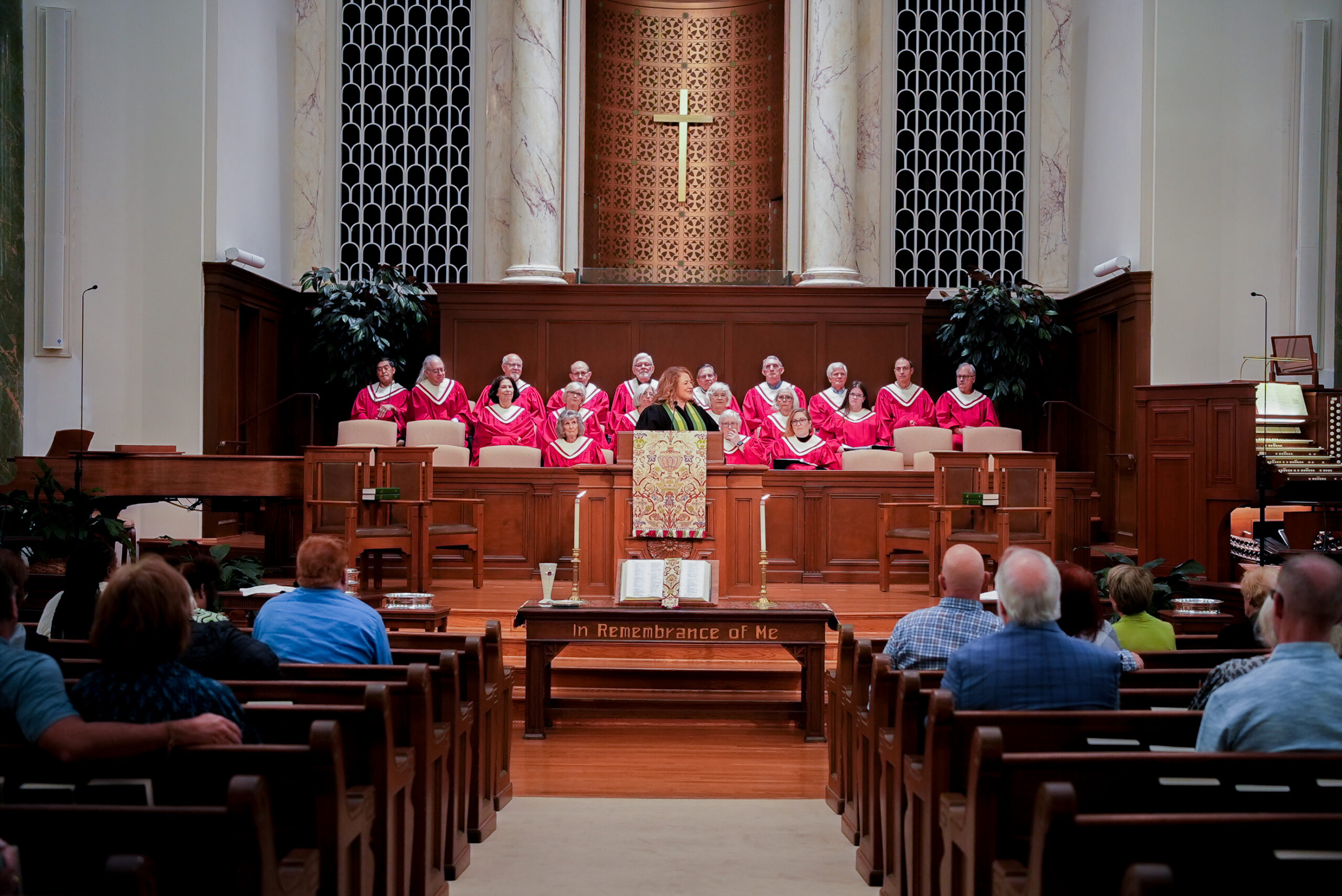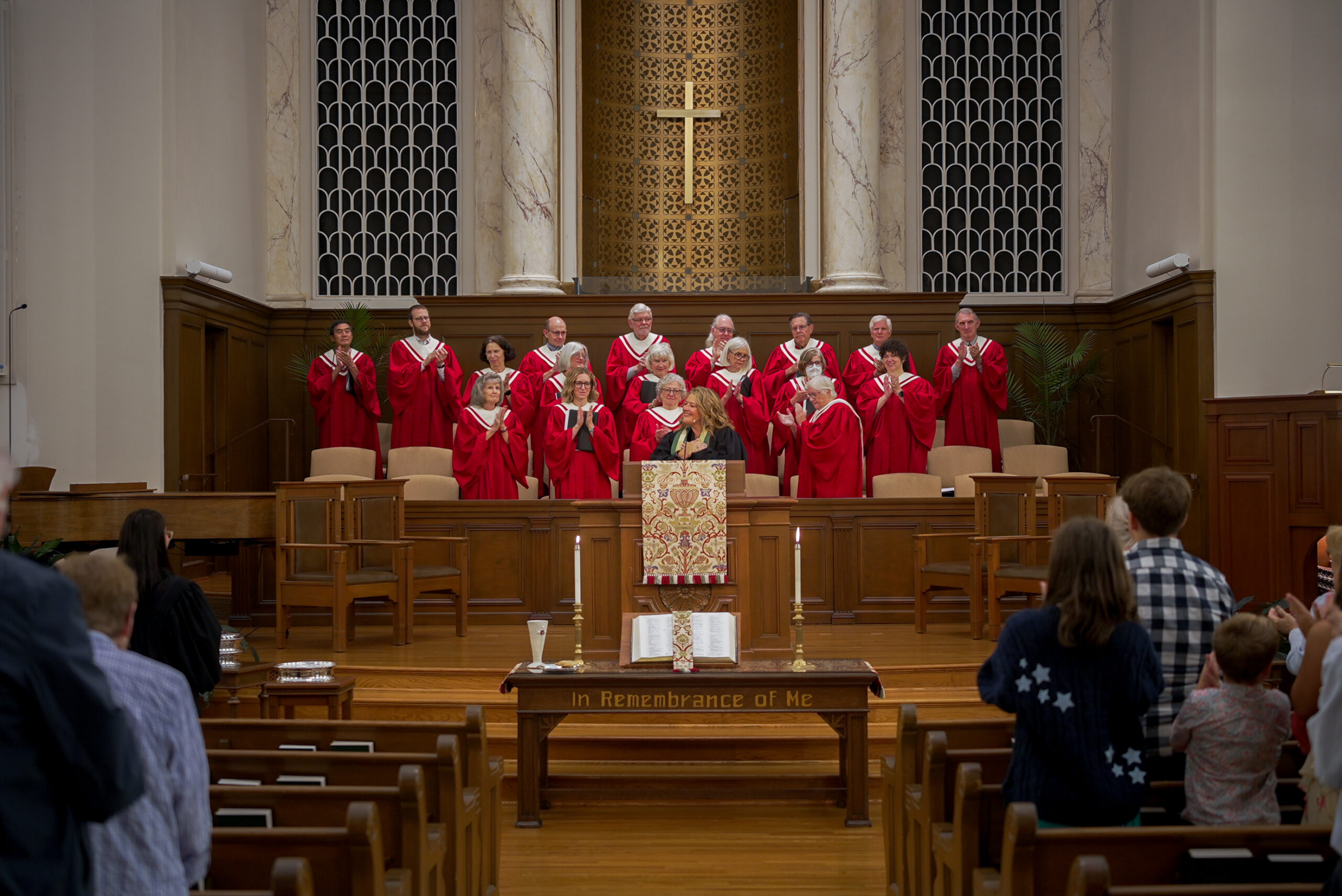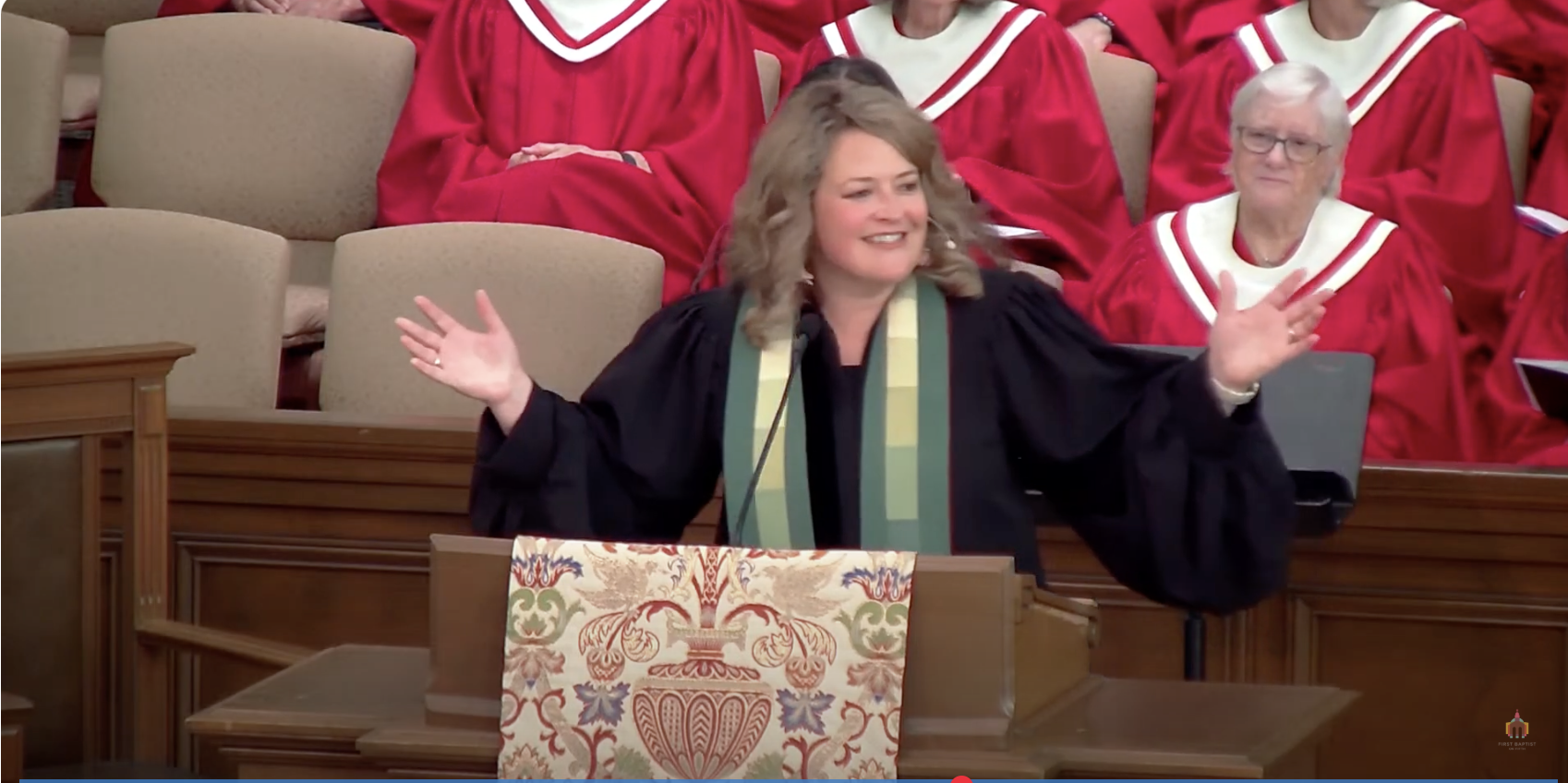I. We’re talking about fulfillment today, and I’m not just referring to the Amazon Fulfillment Centers all around the country who are in their final press to Christmas! By fulfillment, I mean “the achievement or completion of something desired, promised, or predicted,” in the particular way we experience it in our holy scriptures, especially when it pertains to Jesus.1
Since the beginning of time, humans have sought fulfillment – and not just the meaning that comes in one’s life with their family or vocation, their place in the world or their resources used to live it. We have tried desperately to realize that which has been forecasted. Every generation has had their own doomsday prophets – those who read the movements of politicians and global powers and unfolding events and declare that this time, unlike all the rest – this set of natural disasters and signs in the skies – point to when the apocalypse will actually arrive and the end of the world as we know it will be upon us. Others look for fulfillment in the newest diet or the popular exercise, the hottest productivity hack or the viral popularity of manifesting, this job or that deal, these followers or that leader, this scheme or that relationship. We humans are so predictable, aren’t we?
Yet this predictable yearning to realize the predicted is rooted in a deeper longing than surviving or optimizing. It’s as if we know in the marrow of our lives that what we experience isn’t all, that there’s something on the horizon that will make things right, that the world as it is isn’t the world as it should be.
II.All throughout the Advent season, we’ve begun our worship with a reading from the prophet Isaiah. Like any good prophet of old, Isaiah was offering a glimpse, a vision into God’s future for Israel. Of prophets like Isaiah, Walter Brueggemann says, “it is the vocation of the prophet to keep alive the ministry of imagination, to keep on conjuring and proposing futures alternative to the single one the king wants to urge as the only thinkable one.”2 Imagination, you might say. Another way of being, you might add. God’s dream for this world, the preacher’d preach. Or perhaps we’d call it hope fulfilled.
“A shoot will come out from the stump of Jesse,” Isaiah says, “and a branch shall grow out of his roots.” Legacy fulfilled.
“The wolf shall live with the lamb… and a little child shall lead them.” “They shall beat their swords into plowshares.” Peace fulfilled.
“He will feed his flock like a shepherd and gather the lambs in his arms and carry them in his bosom.” Comfort fulfilled.
Tonight: “a people who have walked in darkness have seen a great light.”
Love fulfilled.
With visions of prophecy and fulfillment dancing in our heads, let us turn again to Mary. It is a function of her role in the birth of Jesus that history has assigned the fullness of her meaning in this world as mother. It’s as if we’re unable to separate Mary from Mother of Jesus, and in so doing, limiting what we might learn from her. Today, I want us to listen not to Mother Mary, but to Prophet Mary, to words of hope and fulfillment that spilled from the lips of a teenager when Jesus was but a stirring in her womb.
III.At this point in her story, we know Mary as a young peasant girl, Jewish in practice, raised in conservative Nazareth under the occupation and oppression of Herod and his Roman soldiers. Paired with Joseph, who she hardly knows. Selected by God to birth God into the world. Receiver of an angel’s wild proclamation. Carrier of Love made flesh. Subject of God’s endless favor, in whom God delighted. Prophet Mary, whose song of joy we call the Magnificat, is the longest word we hear from a woman in all the New Testament, whose bold and just words that resound with Jewish history were words the church throughout its history – the church! – struggled to accept.
Yes, it’s Prophet Mary who receives our attention on this Fourth Sunday of Advent. After the angel Gabriel announces her favor with God and new status as the bearer of Jesus, after the blizzard of feelings that must have coursed through her, after all of heaven and earth hung upon her answer, after she said with hope, “here am I, the servant of the Lord; let it be with me according to your word,” after the entirety of her life changed in a moment, Mary did what women have done for centuries – went to a beloved friend and family member to talk it out. Cousin Elizabeth was like an older sister to Mary. The companionship the two find with one another rings out through the ages: two women, overlooked and lowly, one too old and one too young, have been unexpectedly blessed with new life stirring within them — new life that is holy and scary and blissful and terrifying all at once. For in the community of women, between two of the unlikeliest carriers of the divine spark, signs of that new life and of God’s new day abound. Elizabeth’s blessing that tumbles out to Mary at first sight. “Blessed are you among women,” she squeals, her baby John leaping within her, “and blessed is the fruit of your womb.”
That’s the moment before the prophetic song unfurls from Mary into all time and space. That’s the moment – the moment that Elizabeth knew and delighted, the moment that the dream was made real, the moment where Mary realized that in all she didn’t yet know or understand, perhaps, perhaps all shall be well, the moment where blessing led to fulfillment.
“My soul magnifies the Lord,” Prophet Mary sings, “and my spirit rejoices in God my Savior.” Joy fulfilled. Delight fulfilled. Spirit fulfilled.
“He has looked with favor on the lowliness of his servant. Surely from now on all generations will call me blessed.” Legacy fulfilled. Hope fulfilled.
“He has scattered the proud, brought down the powerful from their thrones, and lifted up the lowly.” Justice fulfilled. Vision fulfilled.
“He has filled the hungry with good things and sent the rich away empty.” Compassion fulfilled.
“It was all happening inside of Mary, and she was so sure of it,” Barbara Brown Taylor reminds us, “that she was singing about it ahead of time – not in the future tense but in the past, as if the promise had already come true. Prophets almost never get their verb tenses straight, because part of their gift is being able to see the world as God sees it – not divided into things that are already over and things that have not happened yet, but as an eternally unfolding mystery that surprises everyone – maybe even God.”3
Indeed, the prophet Mary has given the generations the gift of fulfillment – not because all has been made right in our view, but because it has in God’s past-to-future view. Because it’s possible. Because singing a new world into being in all its maddening beauty and hope-filled truth is where it all begins. Because the fulfillment of joy and delight and spirit and legacy and hope and justice and vision and compassion come all in the God who dwells with us in Jesus. “There is no unjust system, oppressive hierarchy, or arrogant leadership structure the Messiah will not upend,” Debie Thomas writes. “No promise the Christ will fail to keep. No broken, exploited life God will not save.”4
IV.Madeleine L’Engle, “I find it a good discipline to practice believing as many as seven impossible things every morning before breakfast. How dull the world would be if we limited ourselves to the possible.”5
Friends, I wonder if Prophet Mary is inviting us into the hope of fulfillment. Into the ministry of imagination. Into day after day of believing seven impossible things before breakfast. Into the risk of birth. Into new life that is messy and scary and terrifying and holy, all wrapped into one.
Today Prophet Mary invites us to consider all we hope to be fulfilled – the relationship, the new idea, the dream, the passion, the commitment, the peace we yearn to reach every corner of our globe – and sing it ahead of time. Live as if despair hadn’t clouded it up yet. Imagine the possibility of what could be and respond as if it might come to life. Every time we take the fullness of who we are in all our humanity and love with all that we are, every time we look in the face of we expect and risk that we can hardly imagine, every time we lean into the companionship of another in joy and in sorrow, every time we give over into the mystery of God that births and blesses, we join Mary in making real this new world and fulfilling the eternal hope of a babe. What song of fulfillment might you sing this year? What would your Magnificat be, right here in the midst of 2023? That same Madeleine L’Engle once said, “this is the irrational season when love blooms bright and wild. Had Mary been filled with reason there’d have been no room for the child.”6
V.I’ve told you before the story from my magical aunt Susan – the minister-turned-weaver-turned-global visionary and entrepreneur in my family, who is the founder and Creative Director of Ibu Movement with roots in Charleston, SC and branches all around the world. You see, the word ‘ibu’ means ‘woman of respect,’ a fitting name for a movement partnering with women from Kenya to Kazakhstan, Colombia to Cambodia, Pakistan to Peru – weavers and knitters, embroiderers and bead-makers – by putting money in the hands of women, disrupting poverty and fashioning change through the art of their hands. As you might imagine, Susan is a force and always overflowing with stories of lives changed through the work of Ibu like this one she shared with us a few years ago at Thanksgiving.
On September 27, 2017, the Taliban unleashed a furious rocket attack on the Kabul airport in Afghanistan, protesting the US Secretary of Defense visiting the capitol, yet killing and wounding civilians and destroying nearby houses. Underneath the rubble and chaos were boxes of Ibu shawls, hand-spun and woven from women in Kashmir to create luscious, soft, black pashminas and sent to women in Kabul to embroider with their signature handiwork. When the folks at Ibu learned amidst the violence and the terror stood simple boxes of shawls sent with love from women to women, they could only wait and wonder what might happen next.
Miracle of miracles, they soon learned that the pashminas somehow were recovered from the wreckage, approved by security, and sent on to the artisan group of embroiderers shepherded by Zolaykha Sherzad. And as if these women knew that bringing new life into a war-soaked world had to begin within them, they came to work. They began again. They returned their hands to threads, their companionship lifting the many from the one. And as if there were a more fitting assignment, these women were scheduled to embroider the Farsi word for ‘peace’ on these pashminas, stitching their prayer and their promise, as Susan describes, ‘like graceful waves spilling over one’s shoulders.’
When the peace pashminas arrived at long last in the Ibu shop just in time for this holy season of sharing gifts among us, Susan said this: “I couldn’t imagine a more meaningful gift to bestow on another at the time of this holiday gift-exchange, when we reach for the highest in one another, when we lift our hopes to the light and celebrate resilience and possibility…. That the women around this fragile, anxious, war-weary world teach us, every day, after dreams are shattered – impossibly deferred – to embroider the torn places with their hope.”7
The ultimate peace had not been fulfilled. But the peace that begins on our shoulders sure had. Because, as Prophet Mary teaches us, weaving a new world into being in all its maddening beauty and hope-filled truth is where it all begins.
VI.I can hardly hear this story of Mary without thinking of the words from medieval mystic Meister Eckhart: “we are all meant to be mothers of God. What good is it to me if this eternal birth of the divine Son takes place unceasingly but does not take place within myself? And, what good is it to me if Mary is full of grace if I am not also full of grace? What good is it to me for the Creator to give birth to his Son if I do not also give birth to him in my time and my culture? This, then, is the fullness of time: when the Son of God is begotten in us.”8
My soul magnifies the Lord! May it be so — may it be fulfilled — in you and in me!




